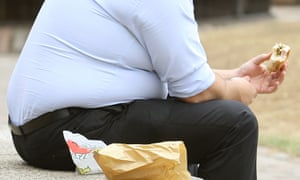Theresa May's first test was obesity strategy and she has failed, health experts say
Strategy has become national scandal given PM’s pledge to look after poor and socially deprived, campaigners argue
The delayed obesity strategy had already attracted strong criticism over its failure to restrict junk-food marketing and advertising and its reliance on voluntary action by the food and drink industry.
And now one campaigner has labelled it a “national scandal” that augurs ill for the future given that, on entering No 10, May pledged to reduce inequalities and that obesitydisproportionately affects those in socially deprived areas.
“She [May] came in saying ‘We are going to look after the poor and the socially deprived’ and immediately shown she’s absolutely not interested. This is a huge crisis facing the UK: we are the most obese nation in Europe;it’s going to bankrupt the NHS. Farcically, she’s gone backwards even on Cameron. It’s a national scandal.Prof Graham MacGregor, an NHS cardiovascular expert and chair ofAction on Sugar, said he had seen a previous version of the plan under David Cameron and while it was still not satisfactory, Thursday’s final version was even worse.
The strategy was delayed for more than a year amid much speculation about its contents and grave warnings by campaigners about the consequences if it did not take a tough line on practices they say are fuelling obesity.“It’s been watered down in the last three weeks. To release it [while May is] on holiday when neither Jeremy Huntnor her are there, it augurs very badly for her as prime minister. If she continues like that it’s [going to be] a disaster.”
They include: supermarket price-cutting promotions on junk food; promotion of unhealthy food to children in restaurants, cafes and takeaways; and advertising of unhealthy food through family TV programmes, social media and websites.
Cancer Research UK’s chief executive, Sir Harpal Kumar, who headed up NHS England’s cancer taskforce, which reported last year, said the government had given in to industry lobbying despite May’s talk on entering office of not being in thrall to “the privileged few”.
“Obesity has a disproportionate impact on the poorest in our society ... The new government faced its first test of this pledge with a chance to address inequality and to protect the next generation from diseases like cancer. This plan fails that test.Writing in the Guardian, he said: “The new prime minister entered Downing Street with a pledge to tackle health inequality and to champion the needs of the individual in preference to the ‘mighty’.
“There can be little doubt that preventing cancer has fallen victim to economic scaremongering and industry lobbying, despite the fact thatobesity costs UK society almost £1bn
While welcoming the reaffirmed commitment to the sugary drinks taxand the funding for school breakfast clubs and sport that it will facilitate, Kumar said there was an inexcusable failure to address the impact of marketing and in-store promotions.
“Some will say parents should be responsible for what their children eat,” he wrote. “Parents clearly have a key role, but as a father I know the pitfalls of pester power and how hard it can be for families to shun the tempting junk and ensure healthy food is always on the table.”
Kumar said restrictions on junk food adverts before the 9pm watershed could more than halve children’s exposure to them.
A Department of Health spokesman said: “Our obesity plan is world-leading, with more far-reaching and comprehensive measures than anything pursued by any other western government. Nevertheless, we will measure progress carefully and do not rule out further action if results are not seen.”
Source : Guardian




Comments
Post a Comment